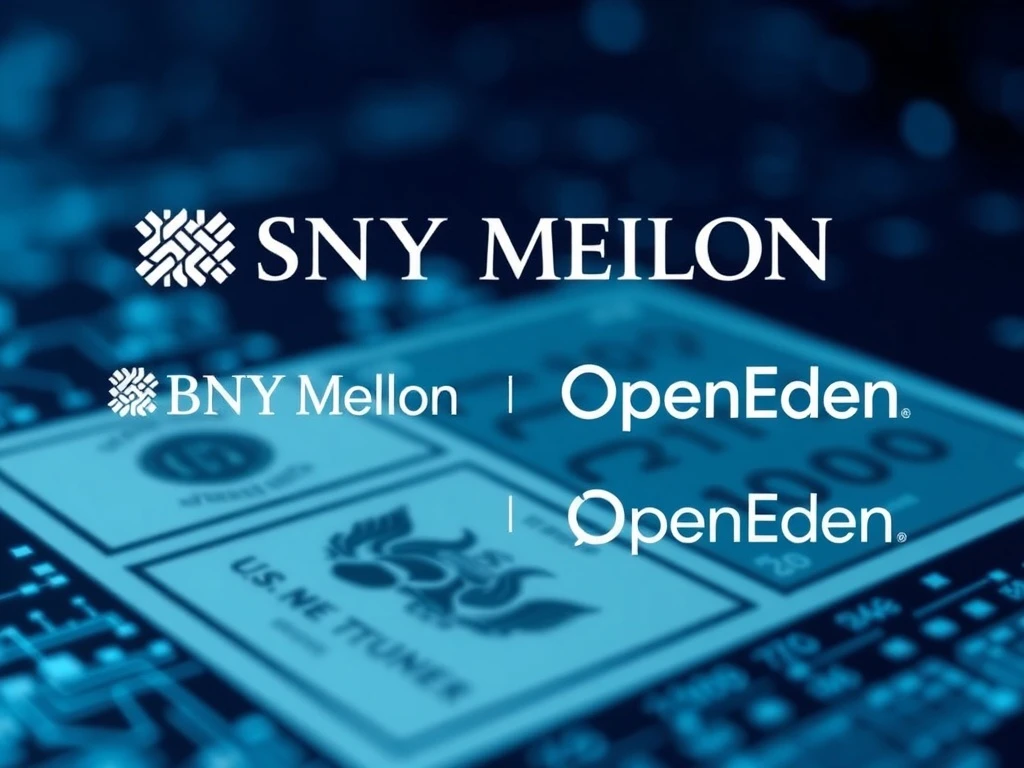Tokenized US Treasuries: BNY Mellon and OpenEden Forge a Pioneering Partnership

The digital asset landscape is rapidly evolving. Traditional finance giants are now embracing blockchain technology. This marks a significant shift in the financial world. Notably, OpenEden recently announced a landmark partnership. They are collaborating with BNY Mellon, one of Wall Street’s largest and oldest custodians. This alliance focuses on managing tokenized US Treasuries. Specifically, BNY Mellon will manage the assets backing OpenEden’s flagship product, TBILL. This move signals a new era for blockchain-based finance and the broader adoption of digital assets.
OpenEden and BNY Mellon’s Strategic Alliance for Tokenized US Treasuries
OpenEden’s partnership with BNY Mellon represents a pivotal moment. It integrates deep traditional finance expertise with innovative blockchain technology. The collaboration centers on OpenEden’s TBILL fund. This fund offers investors blockchain-based access to short-dated US Treasury Bills. It also includes overnight reverse repurchase agreements. Furthermore, the TBILL token represents a share of this underlying portfolio. It also provides associated yield. This innovative product addresses growing demand. Investors seek regulated, onchain cash-management solutions. OpenEden launched TBILL in 2023 to meet this need. This new partnership significantly enhances the fund’s credibility and reach.
A key differentiator for TBILL is its Moody’s “A” rating. This rating signifies upper-medium-grade quality. It indicates low credit risk. Moreover, it reflects a strong capacity to meet financial obligations. Traditional finance standards consider this rating very safe. OpenEden highlights that TBILL is the first tokenized US Treasury fund with such a rating. Importantly, its assets are now managed by a global custodian like BNY Mellon. This brings an unprecedented level of trust to the digital asset space. Jeremy Ng, OpenEden’s founder and CEO, emphasized this point. He stated that combining their platform with BNY Mellon’s fiduciary expertise sets a new standard.
BNY Mellon Deepens Its RWA Tokenization Footprint
BNY Mellon has actively expanded its presence in the digital asset sector. This partnership with OpenEden is a natural progression. It deepens the bank’s commitment to RWA tokenization. BNY Mellon’s investment management arm, Dreyfus, will serve as sub-manager for the TBILL fund. Meanwhile, BNY Mellon will act as the primary custodian for the underlying assets. They will leverage their robust infrastructure for this role. Jose Minaya, BNY Mellon’s global head of investments and wealth, views the bank as a crucial bridge. He sees them connecting traditional finance with emerging digital technologies. This collaboration allows BNY Mellon to extend its liquidity management expertise. Both companies aim to cover the full lifecycle of tokenized assets, from issuance to settlement.
The bank’s engagement with digital assets began in 2022. They launched a digital custody platform that year. This platform securely safeguards institutional clients’ Bitcoin (BTC) and Ether (ETH) holdings. The service includes storing private keys and providing bookkeeping services. This initial step demonstrated BNY Mellon’s forward-thinking approach. On April 3, the bank further expanded its capabilities. They introduced a digital assets data insights product. This product delivers comprehensive onchain and offchain data. It covers various blockchain networks. These actions underscore BNY Mellon’s strategic vision for the evolving financial landscape.
The Growing Significance of Digital Assets in Traditional Finance
Beyond this partnership, BNY Mellon has forged other significant alliances. Recently, the bank collaborated with Goldman Sachs. This project focused on money market funds. In July, both companies announced plans to offer institutional investors access to tokenized money market funds. Such initiatives could unlock 24/7 market access. They also promise real-time settlement in capital markets. These developments collectively highlight a clear trend. Major financial institutions are increasingly integrating blockchain technology. They recognize its potential to revolutionize financial services.
The demand for tokenized US Treasuries continues to grow. This reflects a broader interest in efficient, secure, and transparent financial products. Tokenization transforms illiquid assets into divisible, transferable digital tokens. This enhances liquidity and accessibility for a wider range of investors. It also reduces intermediaries and streamlines processes. Consequently, the convergence of traditional finance and blockchain technology is accelerating. Partnerships like the one between OpenEden and BNY Mellon are crucial catalysts. They build trust and establish best practices in this nascent but rapidly expanding sector. Ultimately, these collaborations pave the way for widespread institutional adoption of blockchain-based solutions.
OpenEden’s Role in Advancing Tokenized Assets
OpenEden plays a crucial role in this evolving ecosystem. Their TBILL product provides a regulated gateway to US Treasury Bills. This is particularly appealing to institutional investors. They seek stable, high-quality assets within the digital realm. The company’s commitment to transparency and compliance is evident. This commitment aligns perfectly with BNY Mellon’s established reputation. The partnership validates OpenEden’s vision. It confirms the growing institutional appetite for well-structured tokenized products. This alliance also demonstrates a maturing market. It shows that robust, compliant solutions are now available for real-world assets on the blockchain.
The future of finance is undoubtedly hybrid. It blends the strengths of traditional systems with the innovations of blockchain. Tokenized assets, particularly those backed by stable instruments like US Treasuries, will likely lead this transformation. This partnership between OpenEden and BNY Mellon is a testament to this future. It provides a blueprint for further collaborations. It also encourages other financial institutions to explore tokenization. This will ultimately drive greater efficiency, accessibility, and trust across global capital markets.







